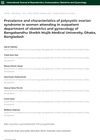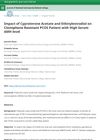 2 citations,
December 2021 in “Cureus”
2 citations,
December 2021 in “Cureus” Most women with Polycystic Ovary Syndrome (PCOS) have skin issues like excessive hair, acne, or hair loss. Hormone imbalances are common, and age, certain hormones, and hormone ratios can predict acne. Obesity, infertility, and high cholesterol are also common in these women.
 September 2023 in “F&S reports”
September 2023 in “F&S reports” PCOS may increase the risk of mental health issues like depression and anxiety.
 September 2022 in “Biomedicines”
September 2022 in “Biomedicines” Lipid Accumulation Product and Free Androgens Index are effective for assessing fatty liver disease risk in women with Polycystic Ovary Syndrome.
 1 citations,
February 2021 in “International journal of reproduction, contraception, obstetrics and gynecology”
1 citations,
February 2021 in “International journal of reproduction, contraception, obstetrics and gynecology” Polycystic Ovary Syndrome (PCOS) is common in infertile women and obese women with PCOS have more severe ovulatory problems, needing more care.
 18 citations,
March 2015 in “Journal of Endocrinological Investigation”
18 citations,
March 2015 in “Journal of Endocrinological Investigation” The research suggests that the ZP4 gene is linked to egg development in women with PCOS but requires more study to understand its role in infertility.
 1 citations,
January 2022 in “Journal of experimental and clinical medicine”
1 citations,
January 2022 in “Journal of experimental and clinical medicine” PCOS is linked to diabetes and insulin resistance, and managing AGEs may help treat related symptoms.
 5 citations,
October 2021 in “Journal of Ovarian Research”
5 citations,
October 2021 in “Journal of Ovarian Research” Cinnamon can help manage symptoms of polycystic ovary syndrome, improve menstrual cycles and fertility, and positively affect cholesterol and blood sugar levels, but more research is needed to confirm these effects and find the best dosage.
 January 2021 in “Scholars journal of medical case reports”
January 2021 in “Scholars journal of medical case reports” A woman with PCOS successfully overcame secondary infertility and became pregnant with triplets after treatment.
 January 2021 in “Journal of Shaheed Suhrawardy Medical College”
January 2021 in “Journal of Shaheed Suhrawardy Medical College” Cyproterone acetate and ethinylestradiol significantly lowered AMH levels in PCOS patients resistant to clomiphene.
 28 citations,
October 2013 in “Journal of The American Academy of Dermatology”
28 citations,
October 2013 in “Journal of The American Academy of Dermatology” Ovarian SAHA syndrome makes women with PCOS more resistant to insulin and increases their risk of blood sugar problems.
April 2019 in “Journal of the Endocrine Society” A young patient with unusual insulin resistance and high testosterone levels had a rare INSR gene mutation.
 1 citations,
January 2020
1 citations,
January 2020 AMH levels in adolescents with PCOS are not affected by their weight.
 August 2024 in “Archives of Women s Mental Health”
August 2024 in “Archives of Women s Mental Health” Women with PCOS have more depression and stress due to high androgen levels, not obesity or insulin resistance.
 5 citations,
October 2014 in “Gynecological Endocrinology”
5 citations,
October 2014 in “Gynecological Endocrinology” Triptorelin helps evaluate hormone production in Sertoli-Leydig cell tumors.
 91 citations,
April 2017 in “Diabetes & Metabolic Syndrome: Clinical Research and Reviews”
91 citations,
April 2017 in “Diabetes & Metabolic Syndrome: Clinical Research and Reviews” Eating fewer calories, less sugar and refined carbs, and more low-glycemic and omega-3 rich foods can help manage PCOS symptoms.
 1 citations,
November 2023 in “Reproductive biology and endocrinology”
1 citations,
November 2023 in “Reproductive biology and endocrinology” Most women with PCOS have insulin resistance, especially those with phenotype B.
 4 citations,
October 2019 in “Case Reports”
4 citations,
October 2019 in “Case Reports” A 33-year-old woman with PCOS and metabolic syndrome was unusually diagnosed with a bone condition called DISH, suggesting a possible link between these conditions.
 July 2023 in “International Ayurvedic medical journal”
July 2023 in “International Ayurvedic medical journal” Ayurvedic treatment can effectively manage PCOS and its symptoms.
 11 citations,
October 2018 in “Hormone and Metabolic Research”
11 citations,
October 2018 in “Hormone and Metabolic Research” Women with PCOS have similar bone density to healthy women, but those who are obese have higher bone density at some body sites.
 60 citations,
May 2018 in “Indian Journal of Psychological Medicine”
60 citations,
May 2018 in “Indian Journal of Psychological Medicine” Women with PCOS often experience anxiety, depression, and a lower quality of life.
 2 citations,
December 2021 in “International journal of Ayurveda and pharma research”
2 citations,
December 2021 in “International journal of Ayurveda and pharma research” Ayurvedic treatment helped reduce PCOS symptoms in a 19-year-old girl.
 11 citations,
November 2017 in “Electronic physician”
11 citations,
November 2017 in “Electronic physician” Depression severity is not linked to PCOS markers like BMI, insulin resistance, or testosterone levels.
 28 citations,
September 2017 in “Gynecological Endocrinology”
28 citations,
September 2017 in “Gynecological Endocrinology” Women with PCOS have higher levels of AMH in their blood and follicles, and this can help predict their risk of overreaction to fertility treatments.
 9 citations,
May 2017 in “Gynecological Endocrinology”
9 citations,
May 2017 in “Gynecological Endocrinology” Transvaginal hydrolaparoscopy is effective for increasing ovulation and pregnancy rates in women with PCOS who didn't respond to clomiphene.
 21 citations,
January 2015 in “Dental research journal”
21 citations,
January 2015 in “Dental research journal” Women with PCOS may be more likely to have gum disease than healthy women.
 18 citations,
December 2014 in “Obstetrics and Gynecology Clinics of North America”
18 citations,
December 2014 in “Obstetrics and Gynecology Clinics of North America” Losing 5-10% body weight can improve PCOS symptoms, letrozole is better than clomiphene for fertility, and managing weight and blood sugar is important to reduce pregnancy complications.
 40 citations,
December 2016 in “Journal of Ovarian Research”
40 citations,
December 2016 in “Journal of Ovarian Research” Rutin may help treat symptoms of polycystic ovary syndrome (PCOS) in rats.
 27 citations,
January 2016 in “Quality of Life Research”
27 citations,
January 2016 in “Quality of Life Research” The PCOSQ-50 is a valid and reliable questionnaire for measuring quality of life in Iranian women with PCOS.
 1 citations,
September 2016 in “Journal of Obstetrics and Gynaecology Research”
1 citations,
September 2016 in “Journal of Obstetrics and Gynaecology Research” The study found no significant link between Helicobacter pylori infection and polycystic ovary syndrome in young females.
 1 citations,
March 2011 in “Infertility”
1 citations,
March 2011 in “Infertility” Hormone imbalances from the pituitary, thyroid, and adrenal glands can cause infertility, but treating these disorders can improve fertility.




























